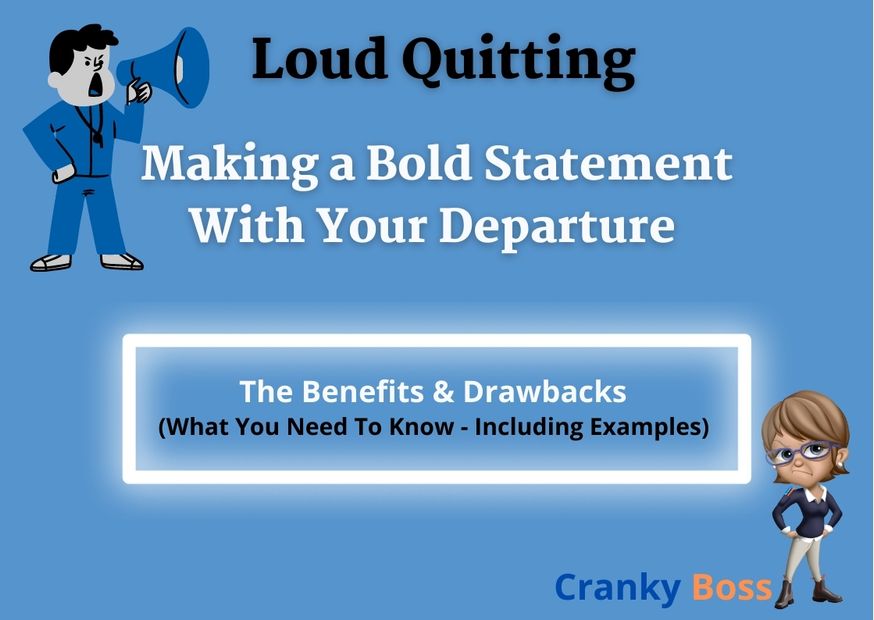Quitting a job can be a significant decision in one’s life. It signifies a desire for change, growth, or a pursuit of something better. While quitting can be done in a variety of ways, some individuals choose to make a lasting impression by opting for what is commonly known as “loud quitting.” This approach involves departing from a job in a manner that draws attention and leaves a lasting impact on both colleagues and employers. Quite the opposite of quiet quitting.
In this article, we will explore the concept of loud quitting, its potential benefits and drawbacks, and discuss examples of how some individuals have successfully executed this bold departure strategy.
What Is Loud Quitting?
Loud quitting refers to the act of leaving a job in a manner that is memorable, attention-grabbing, and often unconventional. It involves making a deliberate effort to create a significant impact with one’s departure. Transitioning from one job to another can be a mundane affair, but loud quitting aims to inject a sense of drama and flair into the process. The objective is to make a statement and ensure that one’s departure is not easily forgotten.
The Benefits of Loud Quitting
Amplified Recognition
By leaving a job in a bold and attention-grabbing manner, individuals who opt for loud quitting can gain increased recognition and visibility. This can be advantageous when seeking new employment opportunities or aiming to stand out in a competitive job market.
Catharsis & Empowerment
Loud quitting allows individuals to reclaim their power and express any grievances or frustrations they may have experienced during their employment. By making a strong exit, they can find catharsis and closure, empowering themselves to move forward with a renewed sense of purpose and self-worth.
Sparking Conversations and Inspiring Change
Loud quitting can initiate conversations and discussions within the workplace or even in the wider industry. It can shed light on issues such as poor working conditions, unfair treatment, or other concerns that need attention. Such acts can inspire change and push organizations to reassess their practices.
The Drawbacks of Loud Quitting
Burning Bridges
Quitting a job loudly can lead to strained relationships and burned bridges, making it challenging to seek references or future opportunities within the same organization. It is essential to consider the potential long-term consequences before resorting to loud quitting. There is always that difference between doing the right thing and the smart thing.
Professional Reputation
While loud quitting can make a statement, it also has the potential to negatively impact an individual’s professional reputation. Employers may view such departures as unprofessional or immature, raising questions about an individual’s reliability, commitment and more importantly emotional intelligence.
Legal Implications
Depending on the nature of the loud quitting act, individuals may risk facing legal consequences or breaching employment contracts. It is crucial to understand the legal ramifications before pursuing such an approach.
Examples of Loud Quitting
Resignation during a public event
An employee announces their resignation in front of colleagues, clients, or the media during a company-wide meeting, conference, or event. They might voice their grievances or express their reasons for leaving in a forceful manner.
Viral resignation videos
Some individuals choose to create videos documenting their resignation and share them on social media platforms. These videos often include a passionate monologue about their reasons for leaving, and they can gain significant attention and viewership.
Writing a scathing resignation letter
Employees sometimes write strongly-worded resignation letters that highlight their dissatisfaction with the company, specific individuals, or policies. These letters may be shared internally or even publicly to amplify their message. Tendering a resignation should be done professionally and graciously.
Publicly confronting management
An employee confronts their superiors or company leaders in a public setting, such as a staff meeting or a company-wide event. They might voice their grievances, criticize management decisions, or challenge the company’s practices before dramatically walking out.
Making a scene
This involves creating a disruptive and attention-grabbing exit. For example, an employee may gather their colleagues and stage a protest or walkout, causing a commotion and drawing attention to their dissatisfaction.
Loud Quitting in History and Today
Loud quitting or making a dramatic exit from a job or situation, is not a new phenomenon. People have been expressing their dissatisfaction or frustrations in various ways throughout history. However, the rise of social media and digital platforms in recent years has certainly made it easier for such actions to gain attention and go viral.
The widespread use of social media allows individuals to share their experiences, grievances, or acts of resignation with a larger audience, potentially amplifying their message. This can include creating videos, writing scathing resignation letters, or publicly confronting management. These actions can quickly gain traction and generate significant attention and discussion.
While loud quitting has gained more visibility in recent years due to social media, it’s important to note that it is still not the norm. In general terms I would always prefer professionalism and politeness when resigning from a job. If it was not possible to have a chat to my supervisor then a well written up email with a polite subject line would be they way to go.
Most people choose to deal with office politics in an effective manner or leave their jobs in a more private and professional manner, focusing on maintaining relationships and leaving on good terms.
For employers, if you need to let go of staff, ensure you use the best practices when doing so.
Conclusion
Loud quitting can be a powerful way to leave a lasting impression, amplify one’s voice, and inspire change. However, it also carries potential risks and consequences that individuals must carefully consider. By understanding the benefits and drawbacks associated with loud quitting, one can make an informed decision about whether this departure strategy aligns with their personal and professional goals. Remember, quitting should ultimately be about personal growth and pursuing opportunities that align with one’s values and aspirations. Learning to negotiate like a pro can be far more beneficial than forming a loud exit.

